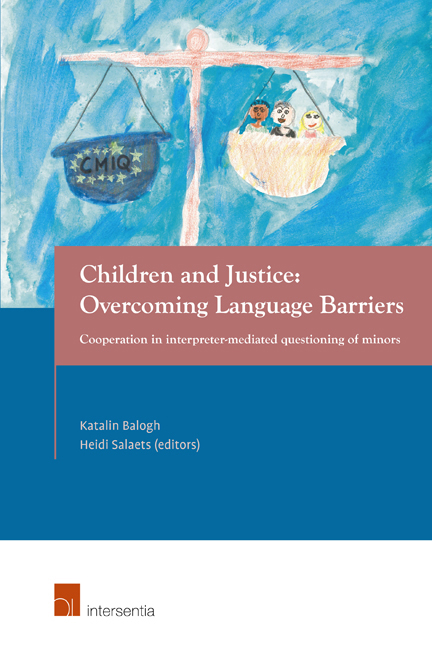 Children and Justice: Overcoming Language Barriers
Children and Justice: Overcoming Language Barriers Chapter 4 - CO-Minor-IN/QUEST research findings
Published online by Cambridge University Press: 22 November 2017
Summary
SUMMARY OF THE SURVEY FINDINGS
INTRODUCTION
Since the project, its actions, partners, rationale and general framework have been described in the introductory chapter, in this section, we will focus on important issues concerning the survey, which basically means the methodology, the results and discussion of the results.
First, the authors will address the traditional five Ws- and one H questions, central to every information-gathering process. First of all, the motive for the survey (why?) and, next: the time schedule (when?), the content (what?), the respondents (who?), and the distribution (where?) - all of which can be summarised in the methodology (how?). Methodology obviously covers both the design of the questionnaire and the analysis of the results.
MOTIVES AND FIRST STEPS TOWARDS A QUESTIONNAIRE: THE WORKSHOP
From the beginning, it was stated in the project description that a needs analysis of the parties involved in the questioning of children was necessary. It became clear that the domain of Interpreter-mediated Questioning of Minors (ImQM) had hardly been explored, as has been shown in the literature review: several publications deal with questioning of minors in criminal (and civil) proceedings, but little has been published on the situation when minors do not speak the language of the court/jurisdiction. Moreover, in this kind of setting, we are dealing with different professionals ranging from the - specially trained - police officer to the psychologist, the child support worker, the youth lawyer, the youth judge and the interpreter. A trust person is possibly present but (s)he is not necessarily an expert and/or professional; this person may be or mostly is a parent, a family member, or a close friend.
To perform a needs analysis, it is very important to pose the right questions and to know exactly what the aims are. To explore the questioning of minors with an interpreter in more depth, a twofold methodology was applied: first, a literature review, which has been discussed in Section 1.1; secondly, since questionnaire design is extremely important, we decided to organise a workshop where experts of the different domains involved in interpreter-mediated questioning of minors could have a face-to-face meeting.
- Type
- Chapter
- Information
- Children and Justice: Overcoming Language BarriersCooperation in interpreter-mediated questioning of minors, pp. 175 - 326Publisher: IntersentiaPrint publication year: 2015


